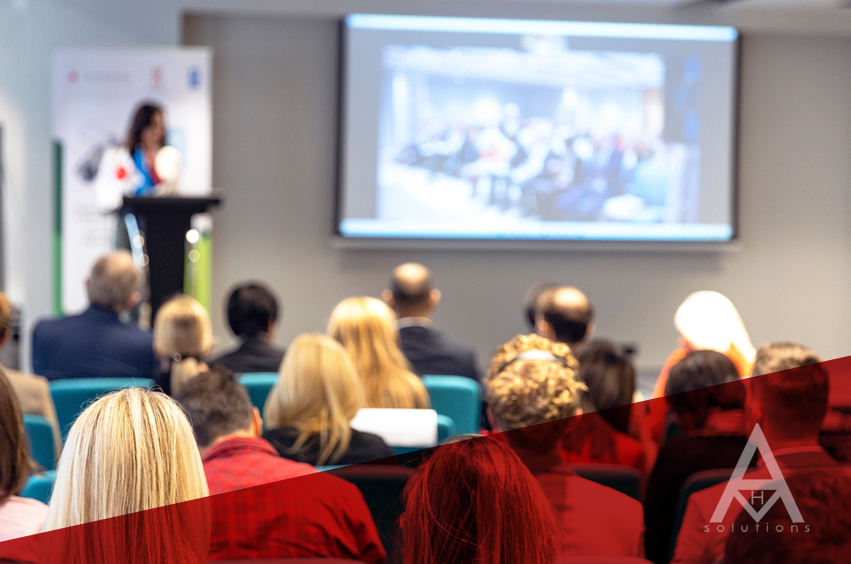
3 Top Use Cases for Hybrid Events
COVID-19 was a catalyst for a huge increase in virtual events. Companies had to adjust their thinking and realize that an engaged audience didn’t necessarily have to be in person. Technology integrating streaming, on demand-video, chat, quizzes and polls, and even social media, became more readily available and has advanced by leaps and bounds during the past few years.
Even as travel restrictions have relaxed and in-person gatherings became possible once again, many corporations see the benefits of keeping the virtual portion of their events going strong. By doing so, both remote and in-person attendees can have a rich, engaging experience. While hybrid events have been around for quite a while, they’re now a much more popular option for companies large and small.
Keep in mind, not every event is a hybrid contender. A corporate retreat where outdoor activities, in-person team-building exercises, or social events are the main focus does not make for a good hybrid experience. So when are hybrid events a good idea? Here are the top three use cases for hybrid company events.

#1: Increase Remote Worker, Customer, and Investor Attendance at Company Conferences
Company conferences aren’t just for employees. Corporations are often touting new products and future plans and want to get the word out to customers and investors, as well as their own employees.
On top of that, more and more organizations provide remote work environments or have a global reach due to their size or the nature of their product. And having a far-flung customer base, a remote workforce in combination with an in-house workforce, and the desire to attract more investment, can present some challenges when it comes to annual company conferences.
The logistics and expense of having everyone travel to the same location can be prohibitive and prevent key people from being able to participate. Hybrid company conferences can consist of the virtual elements:
• live streaming of the entire event
• on-demand presentations and speeches
• break out rooms for remote attendees to participate in workshops and discussions
• intimate Q&A sessions with keynote speakers
All of this, while in-person attendees take part in similar experiences.
Companies providing hybrid meetings for their employees, customers, and investors have seen a large increase in attendance both remotely and in person. Companies like Apple and Twitter use the hybrid model for their corporate conferences.
#2: Enable Efficient Team Training
When it’s time to train your sales team on a new product, you may find that only some of them are available in-office. The rest are working remotely, traveling, or possibly working out of satellite offices. Providing a hybrid solution to corporate training is an efficient, cost-effective, and timely way to level up the team.
Those attending in-person and remotely can gain insight and perspective from the entire team as well as get all the same training at the same time. This also enables you to record the training for team members to reference on-demand later. Obviously, it is not just your sales team that can benefit from hybrid training sessions. All teams that have both in-person and remote staff will benefit from a hybrid company training solution.

#3: Attract Worldwide Participation in Industry Conferences
Another phenomenal use of hybrid events is for industry conferences. Instead of providing multiple conferences on multiple continents, which can be costly, hybrid events allow a more efficient, carbon-friendly, and accessible means to bring industry professionals together across the globe. While many may decide to participate in person, it is not unheard of to have an even larger number of remote attendees.
As with corporate events, industry conferences have seen an increase in attendance not just remotely, but in-person. People who would have otherwise not experienced the conference at all are more likely to attend remotely, as it is a smaller commitment of their time and resources.
Plus, there’s an added future benefit too. Many virtual attendees choose to attend in person the following year consistently growing the in-person event audience. As attendees grow both in person and virtually, industry conferences grow and have more opportunities than ever before.
The Logistics of Putting Together a Hybrid Event
Hybrid events are more than putting a YouTube video online for people to view on-demand, or even just live streaming. Providing a full-fledged, interactive experience for both those attending in-person and online needs careful planning.
While there are plenty of choices for technology, you need to make sure your venue has the capabilities to support that technology as well as in-person meeting requirements. This includes space and high-capacity broadband. Additionally, it’s a must-have to know what equipment will be supplied by the venue and which you’ll be responsible to provide.
Hiring a company like Applied Meetings & Hospitality Solutions, which specializes in providing logistical help to event planners at no cost, is a good way to make sure your hybrid event goes off without a hitch. Schedule a discovery call to learn more about how Applied Meetings & Hospitality Solutions can help you with your next hybrid event.


